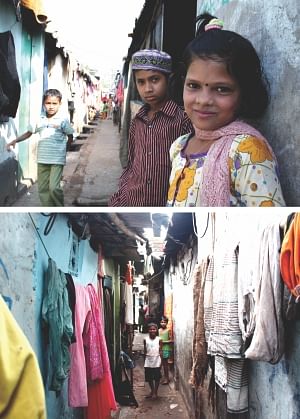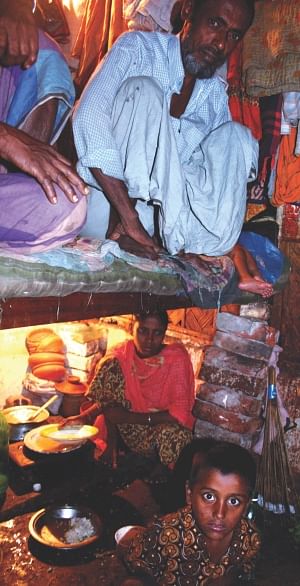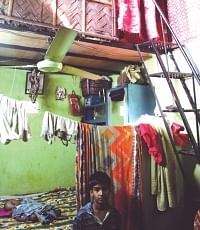| Home - Back Issues - The Team - Contact Us |
 |
| Volume 10 |Issue 27 | July 15, 2011 | |
|
|
Human Rights There is no Place Like Home Khalid Hussain
In Bangladesh, approximately 160,000 members of the marginalised 'Bihari' Urdu-speaking linguistic minority are living in 116 different slums around the country. Despite the recent changes in their voter and ID registration, they continue to live in refugee camp-like conditions, facing regular discrimination and perpetual ignorance by the State. In the words of one Camp resident, "Language and culture can't be opponents for any one; I am a Bihari Urdu speaking linguistic minority of Bangladesh. I have a national ID card and I am enlisted as a voter. Unfortunately my mother speaks Urdu and I am Urdu speaking, and the camp dwelling Urdu speakers are marginalised in Bangladeshi society due to language." The constitution of Bangladesh states in article 28: “The State shall not discriminate against any citizen only on the grounds of religion, race, sex, caste, or place of birth.” The significant missing word in the above Article is “language.” The Urdu speaking linguistic minority is not recognised by the constitution of Bangladesh. If I say that I am Bengali then I am in the majority, but if I choose to practice my language and culture, I become a member of the unrecognised minority, and for that we are facing perpetual discrimination in every way of life.
Camp-dwelling Urdu-speakers face significant discrimination in terms of access to employment. Many of community members have personal stories of discrimination, and the right to employment is one of the rights the community currently cannot access. Not only are we denied all government positions, but due to the Camp address and “undefined” legal status wide discrimination in the job market remains a problem. Camp residents are not in a position to produce the kinds of documentation that employers require to prove a potential employee's legal status (these may take the form of a local commissioner's certificate or character reference from a local representative). Without these 'papers of citizenship', much of the market is inaccessible to us and many of our rights are restricted. Indeed, even those who do find formal employment often face wage discrimination and inequality of treatment. As a result the vast majority of Biharis are pushed into the informal sector, working as rickshaw-pullers, drivers, butchers, barbers, mechanics and craft workers, earning meagre wages and living under the poverty line. After citizenship has been granted to them, no changes have been made in the every day life at the camp or in the policy of the government. The government of Bangladesh should formally recognise the Biharis as a linguistic minority of Bangladesh and also include “language” in article 28 of the constitution of Bangladesh. The Bihari youth can be a good source of foreign remittance. It is too difficult for the camp based Urdu speaking community to get a passport though they have national ID cards or their names are in the voter list. Some young men have tried to get a passport to work as migrant workers in the Middle East but the passport authority has denied their right to have passports.
Copyright
(R) thedailystar.net 2011 |


 We want to project ourselves with our own language and culture. Now the time has come to formally recognise that the Urdu speaking Biharis are also Bangladeshis and that they have equal rights in their country just as any other citizen. We need to regain our dignity, which is the only way forward for this community's future success. A tolerant attitude is one of the most important elements to reduce the discrimination against the Bihari community. We propose that the government of Bangladesh establish a rehabilitation trust fund to mobilise funding from international Islamic organisations, bilateral donors and other national and international donor agencies in order to ensure a safe and secure future for future generations of Urdu-speakers in Bangladesh. Let's remove racism, xenophobia and intolerance from our society.
We want to project ourselves with our own language and culture. Now the time has come to formally recognise that the Urdu speaking Biharis are also Bangladeshis and that they have equal rights in their country just as any other citizen. We need to regain our dignity, which is the only way forward for this community's future success. A tolerant attitude is one of the most important elements to reduce the discrimination against the Bihari community. We propose that the government of Bangladesh establish a rehabilitation trust fund to mobilise funding from international Islamic organisations, bilateral donors and other national and international donor agencies in order to ensure a safe and secure future for future generations of Urdu-speakers in Bangladesh. Let's remove racism, xenophobia and intolerance from our society.